'Good Jobs' of the Future: Redefining what workers want
Having a good job can definitely change your life. Whether it’s well paid, gives you a sense of purpose and career advancement, or helps you achieve a healthy work-life balance, your job can have a major influence on your wellbeing. But what exactly makes a ‘good job’ in the years to come? Jobseeker surveyed more than 1,000 American workers across various industries, age groups, and seniority levels, to answer the question. Let’s take a look at how the American workforce defines a ‘good job’, and what employees think about the future of jobs in the US.
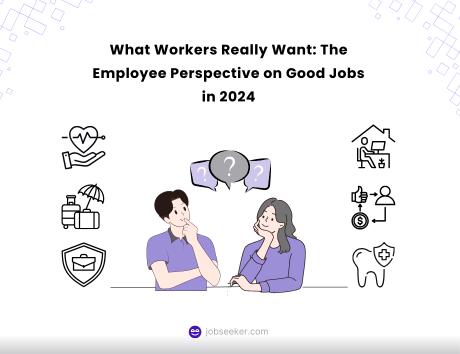
Good jobs change lives. This was the slogan of Labor Day 2024, but it’s more than just a catchy phrase. In the article, you’ll find the American workers’ perspective on the most critical elements of a ‘good job’, along with thoughts on the most important employment benefits and what good jobs look like for the future.
Contents:
- What do workers think was a “good job” in 2024?
- Which benefits are the most important for American workers?
- What do workers expect to be a good job in the next 5 years?
- Expert analysis of what makes a good job now, and in the future
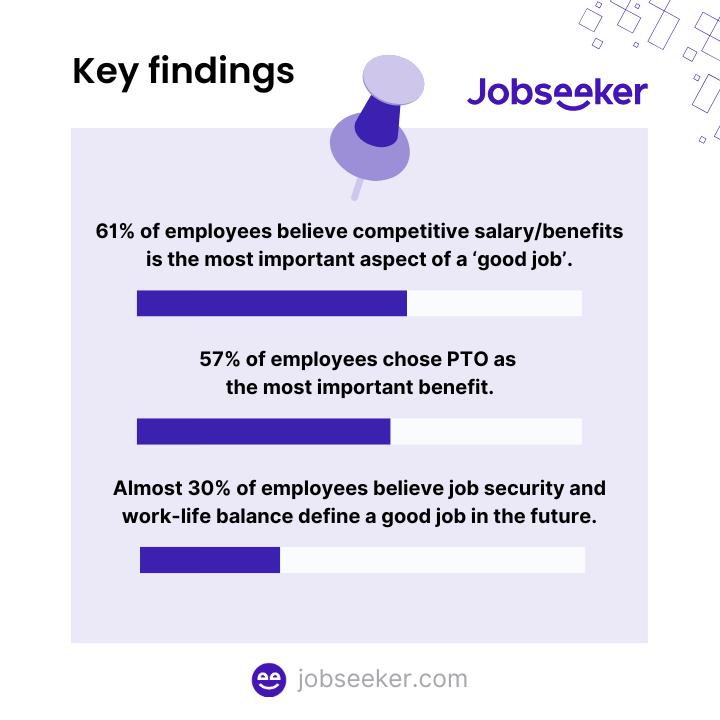
What is a ‘good job’ in 2024?
There was a range of opinions about the most important aspects of a ‘good job’ in 2024 although perhaps the simplest factors had the biggest influence overall. Financial and job security concerns were prioritized over other aspects, but a positive work environment and culture, and opportunities for advancement were also considered important. Other aspects that might affect job satisfaction and overall wellbeing were further down the list of priorities, but still rated important by some respondents.
Key findings from the survey include:
- According to employees, a competitive salary/benefits was the most important aspect of a ‘good job’. 61% of employees mentioned this as one of the most critical factors.
- Job security was the next most important factor, with 51% of employees mentioning this, suggesting that stability and assurances about the future are higher priorities than the working environment and the structure and content of the jobs themselves.
- Just less than half of employees (46%) mentioned a positive work environment and culture, while 40% thought opportunities for career advancement were among the most critical elements of a good job.
- Flexibility (31%), work-life balance (28%), and meaningful or impactful work (10%) were prioritized by fewer respondents.
- Good jobs were more closely associated with established corporations than startups. Almost 50% of employees believed that good jobs were likely to be in a larger company, with just 15% associating good jobs with startup firms.
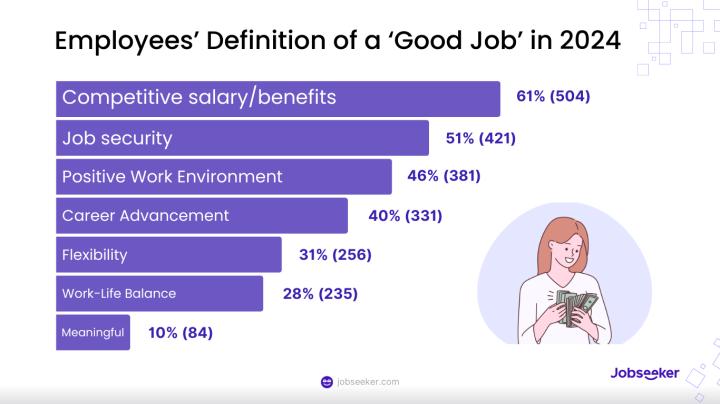
‘Good job’ aspects by gender, age and seniority
There are slight differences in opinion over what makes a good job, depending on gender, age, seniority, and industry sector. Although the order of priorities is broadly the same between different groups of employees, with salary/benefits and job security the most important factors, the emphasis on each aspect differs slightly.
A higher proportion of female than male employees identified salary and benefits as the most important factor in a good job (63% vs. 58%), while job security was slightly more important for men than it was for women (54% vs. 49%).
Men also valued career advancement more than women (45% vs. 35%), while a positive work environment, flexibility, work-life balance and meaningful work were all slightly more valued by females.
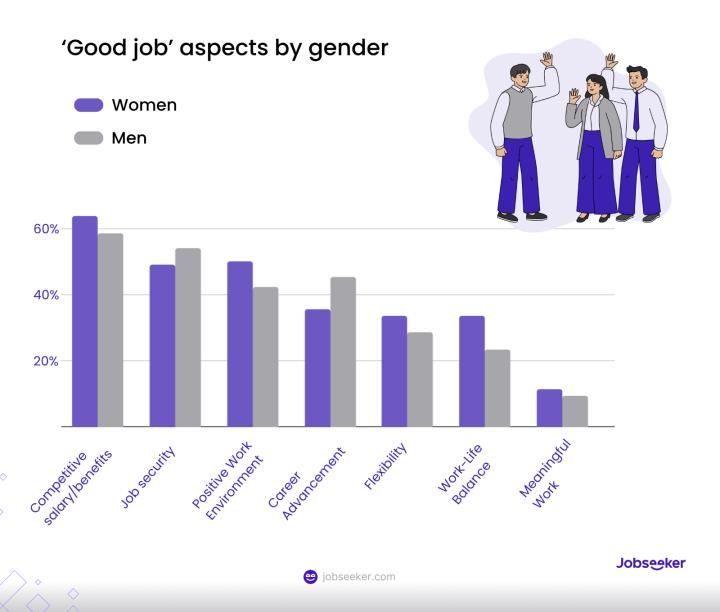
There were also various differences in the priorities for a ‘good job’ by age, seniority and industry sector:
- A competitive salary and benefits were most important for the older employees (45-54 and 55+), while job security was a higher priority for 25-34 year olds than any other age group.
- The youngest and oldest age groups valued a positive work environment more than other age groups, with meaningful, impactful work most valued by older respondents. For the youngest respondents, a positive work environment was almost as important as a good salary and benefits (21% vs. 22%).
- The most senior employees were most likely to prioritize salary and benefits, with 79% of those in managerial or higher roles mentioning this. Meanwhile, job security was prioritized more by all other seniority levels than it was by managers.
- Those working in education valued job security more highly than any other industry sector (23%), while opportunities for career advancement were most valued by engineers (21%).
What benefits are employees looking for?
When it comes to benefits, there’s one clear priority for American workers. Paid time off is the most commonly mentioned benefit employees look for in a good job. Other benefits, were spread evenly around, with bonuses and incentives, dental and vision and life insurance all rated similarly by employees.
The key findings on benefits were as follows:
- Paid time off was mentioned by 57% of employees as a key benefit they’d hope to receive as part of their job.
- Dental and vision insurance were identified as the second most important benefit, supporting the emphasis on financial matters by most employees.
- Bonuses and incentives (40%), life insurance (35%) and disability insurance (14%) received varying levels of support among workers.
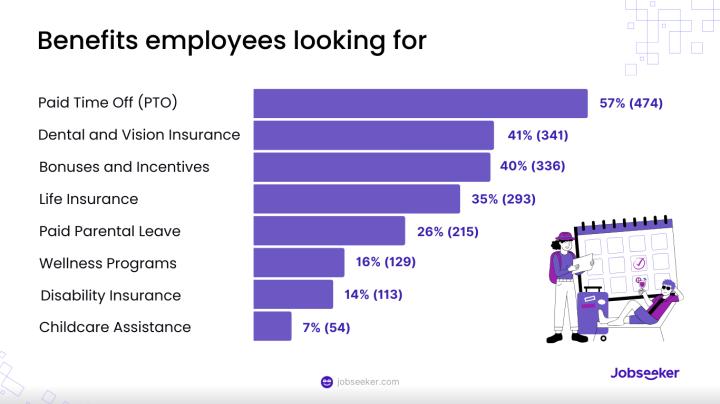
Priority of benefits according to different groups
As with the main elements of what makes a ‘good job’, the importance of different benefits varied slightly according to gender, age, seniority, and industry sector, although there were few differences in the overall order of priority.
The most significant difference in benefit priorities between male and female respondents was in childcare assistance. Although this was still the lowest priority benefit listed by both male and female employees, it was still mentioned by almost double the number of women compared to men (8.4% vs. 4.5%). Women also placed greater emphasis on paid time off than men, with 60% of women mentioning it compared to 54% of men.
Other findings regarding the importance of benefits to different groups included the following:
- Life stage had an impact on the importance of certain benefits, with the 25-35 age group placing greater emphasis on paid parental leave (37%) and life insurance (42%) than any other age group.
- Those aged 55+ were most likely to cite bonuses and incentives as the most important type of benefit, perhaps helping them to save for retirement.
- Bonuses and incentives were far more important to those in the most senior roles. 71% of managers mentioned these, compared to averages among other groups of between 34 and 42%.
- Paid time off was most important to entry-level, junior, and management-level employees, with those in the middle less concerned with it.
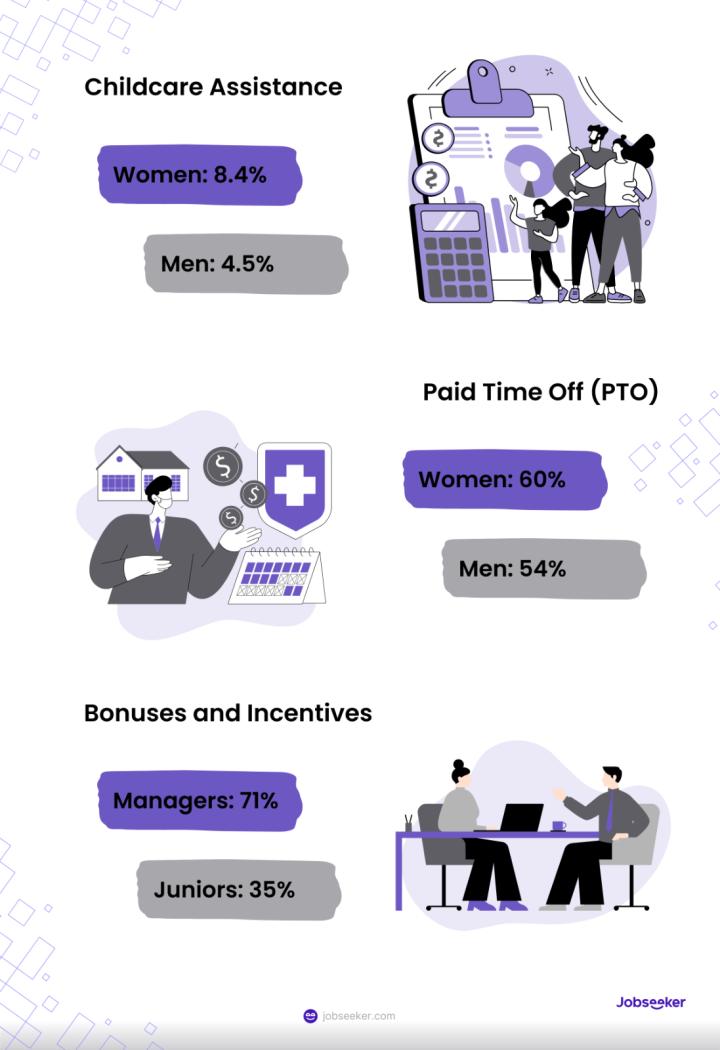
The future of ‘good jobs’ - what do we expect in the next 5 years?
The future of work in the US is framed by continuing technological development and influence (1), addressing the climate emergency (2) and a focus on supporting employees to be healthy and productive (3). But are these reflected in the things employees are looking for in ‘good jobs’ of the future?
Our research suggests there are some concerns over these issues, but ensuring job security over the next 5 years will be pivotal in maintaining employee well-being and satisfaction.
- 29% of employees identified job security as the most pressing issue of the next 5 years.
- 43% of respondents mentioned priorities linked to employee wellbeing, with work-life balance (27%) and flexibility (16%) second and third on the list.
- Continuous learning and benefits were mentioned by 10% of respondents respectively.
- Ethical practices and technological adoption were the least prioritized aspects of a ‘good job’, highlighted by 5% and 3% of employees.
- Opinion over the influence of technological advances was split among respondents. While 4 in 10 employees (41%) fear that Artificial Intelligence (AI) will reduce the number of good jobs available, a similar number (38%) believe it will create more good jobs.
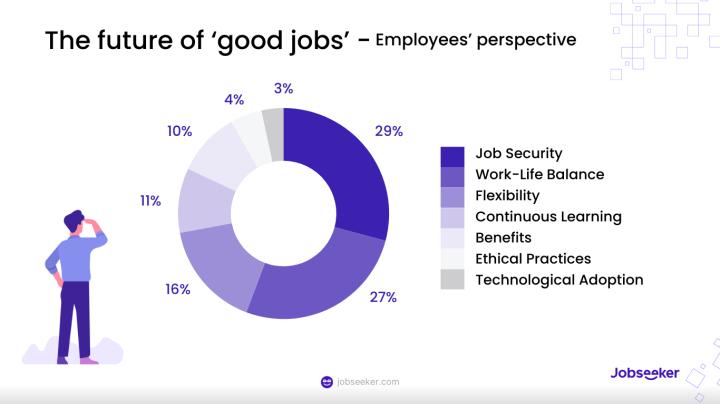
The future priorities of different groups
The future landscape of work could look very different depending on your career stage and other personal factors. Let’s take a look at some differences by gender, age, seniority and industry sector:
- Men and women both prioritize job security and work-life balance over other factors, but women rate work-life balance as slightly more important than men (28% vs. 25%).
- There are substantial differences between generations in concerns over job security. The issue was highlighted far more by younger respondents. 37% of 18-24-year-olds mentioned it compared to between 28% and 31% of other age groups.
- Work-life balance is less important to the youngest workers compared to older groups, but continuous learning and development are more important, further emphasizing the generation gap.
- Benefits grow in importance as employees get older, emerging as the third-highest priority for over 55s.
- Junior and mid-level employees were most concerned about work-life balance (28% and 30% respectively), and entry-level employees valued flexibility more than any other group (20%).
- Paid time off was rated more highly by retail employees than any other industry sector (83%), while paid parental leave was most valued by those working in education (43%).
Good jobs and good humor
In a more light-hearted twist, we asked workers what kind of movie their job would be. The good humor and positive attitude of American workers are on full display, with more than a quarter of employees saying their job would be a comedy movie (28%). However, it’s unclear whether it would be slapstick, rom-com, satirical or black comedy. While 18% said their job was a drama, a quarter of employees (25%) likened their job to an action or adventure film – a scenario that might appeal to those who, in another 2024 survey in the US, listed ‘firefighter’ or ‘flight attendant’ as their top dream job.
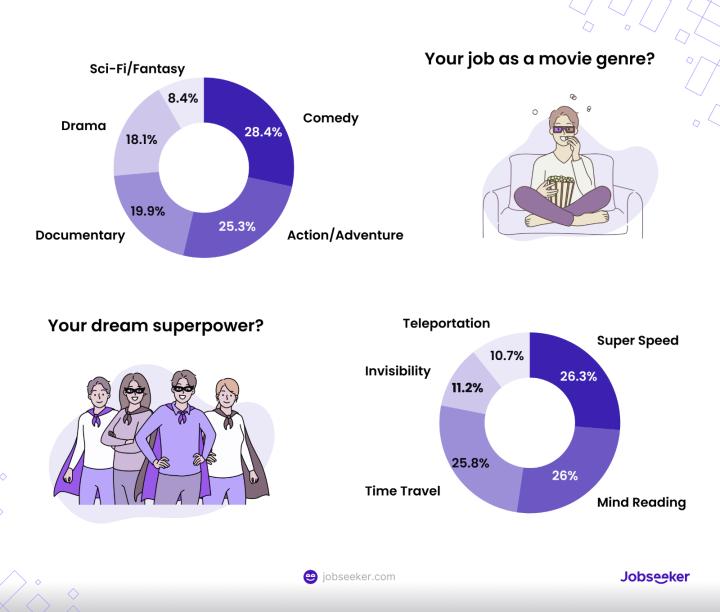
When choosing a superpower to help improve their work, the majority picked powers to make them a better, more productive colleague. ‘Super speed to get tasks done faster’, and ‘mind reading to better understand what colleagues need from you’ were mentioned by 26% of respondents respectively. ‘Invisibility to be able to work uninterrupted’ and ‘teleportation to avoid the morning commute’ were both only mentioned by 11% of respondents.
Expert Analysis: how can good jobs change lives, now and in the future?
While the world of work is changing, the things that employees value in a ‘good job’ in 2024 and beyond are familiar. According to career experts at Jobseeker, while some employees see improvements to workplace culture and additional rights for workers as important, finances and job security are still the most life-changing aspects of a job. This contrasts with current levels of satisfaction with salaries in the US. According to Pew Research, only 34% of workers are extremely satisfied or very satisfied with how much they’re paid (4).
Salaries are the single most critical issue, regardless of gender. However, a slightly greater focus on salaries overall by women suggests the future of good jobs in the USA needs to continue to address the gender pay gap, which persists despite efforts to reduce it. Women still earn, on average, 16% less than men (5). Perhaps inevitably, the oldest and most senior employees are focused more on salary and bonuses, and less on job security and opportunities for career development.
The emphasis on the traditional, widespread benefit of paid time off suggests that the expectations of American employees are quite moderate. The study suggests the key to a life-changing job is, for many, grounded in the simple reassurance of a decent salary, job security and paid holiday.
US workers are less likely on average to take all their paid leave than employees from some European countries (6), while burnout and mental health are growing concerns. As such, it’s easy to see why paid time off is a major concern to the average US employee.
Other elements of the job leading to more flexible, manageable work life, and benefits related to health and wellbeing are identified as important by some, but not at the same level as paid time off. However, while flexibility and work-life balance were not the top factors in defining a good job, the emphasis on paid time off suggests workers are still concerned with their mental health. Indeed, personal time to unwind and disconnect from work is highly valued.
For the future, as eyes turn towards the growing influence of technology, environmental concerns and employee wellbeing, the focus of employees remains relatively simple. Job security emerges as the single most life-changing aspect of good jobs in the future for US workers. The perceived threat of technology, and in particular AI to future jobs may be a factor, with the research suggesting that as many as 4 in 10 employees fearing that AI may be a threat to job security (7).
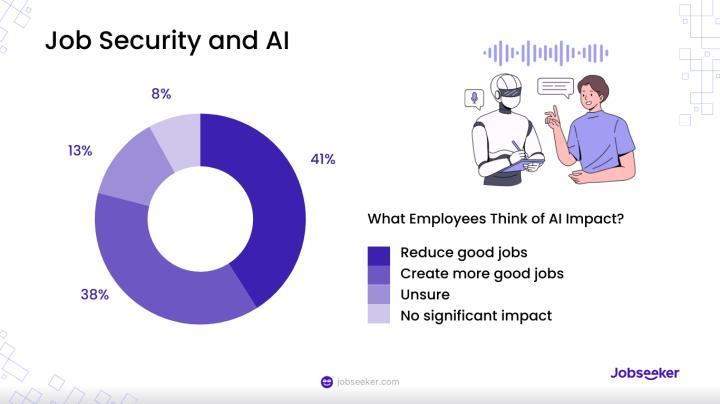
However, many employees are also looking to create a better balance between their job and their life outside work, and are hoping to see developments in this area. The dual issues of technological growth and the ethical practices linked to the climate crisis and other social and environmental issues are further down the list of priorities. For employers, the challenge will be to adopt technological advancements and ethical working practices without disrupting job security and worker salaries and benefits.
Methodology
This study was conducted by Jobseeker, the resume and cover letter experts in 23 languages and over 200 countries, and is aimed to explore and understand the key factors that American workers consider essential for defining a "good job" in 2024.
Our research focused on three main areas: the constituents of a good job, prioritized job benefits, and anticipated future trends in the job market. We conducted an online survey, initially reaching 1,189 respondents across various industries, age groups, seniority levels, and genders. After a thorough data-cleaning process to remove incomplete or invalid responses, our final sample consisted of 827 participants. Throughout the data collection process, we ensured ethical standards by anonymizing all responses and obtaining informed consent from each participant.
Our analysis approach combined both quantitative and qualitative methods to provide a comprehensive understanding of the data. Quantitative analysis included descriptive statistics to identify trends and Chi-Square tests to determine significant relationships between demographic groups and their job perceptions.
Research & Analysis by: Reyhane Mansouri, PhD
Written by: Mike Potter, CPRW
Sources:
- World Economic Forum, The Future of Jobs Report 2023
- Boston Consulting Group, The Next 50 Years of Work
- Accenture, Future of work research
- Pew Research Center, How Americans View Their Jobs
- Forbes, Gender Pay Gap Statistics In 2024
- BBC, Why it's so hard for US workers to ask for time off
- Pew Research Center, Which U.S. Workers Are More Exposed to AI on Their Jobs?
Impress potential employers with your resume
Follow step-by-step professional guidance to create a polished resume in minutes.



